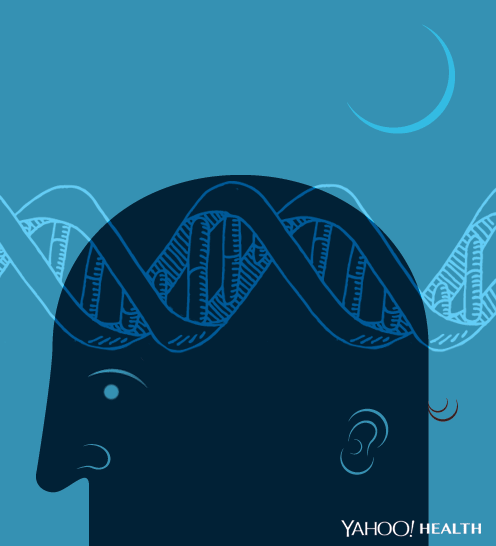Could Insomnia Be in Your DNA?

Toss and turn at night? You’ll find the results of this new study eye-opening. (GIF: Getty/Priscilla De Castro for Yahoo Health)
If you find yourself tossing and turning in the middle of the night, it just may be your parents’ fault.
A new study involving twins has found that genetics play a role in insomnia, with more women inheriting this lack-of-sleep gene than men.
Researchers at Virginia Commonwealth examined data from approximately 7,500 twins. They discovered a genetic component to the sleep disorder that was passed down to 59 percent of the female participants and 38 percent of the male participants. Their findings are published in the September issue of the journal Sleep.
According to the American Academy of Sleep Medicine, insomnia is a common sleep complaint that affects nearly 30 percent of adults. About 10 percent of those adults suffer from chronic insomnia, which is when insomnia occurs at least three times per week for at least three months. The sleep disorder is known to affect women more than men.
Related: What Chronic Insomnia Really Feels Like
“The results indicate that genetic influences have a significant role in the development of insomnia symptoms,” study researcher Mackenzie J. Lind, a doctoral candidate at the Virginia Institute for Psychiatric and Behavioral Genetics at VCU, tells Yahoo Health. In other words, “insomnia symptoms do appear to ‘run in families.’”
But in final models, Lind notes, environmental influences were also found to play an important role in insomnia. So could lifestyle adjustments have the ability to turn off these genes? Perhaps, says Lind.
“It is possible that epigenetics [the ability to turn on and off genes through lifestyle or environmental factors] could contribute to the development of insomnia symptoms, but this is not something that could be examined within the context of the current data set,” she says.
Lind adds that continuing research is already in the works, which is examining “the genetic overlap between insomnia symptoms and other common psychiatric disorders — for example, depression and alcohol use disorders — using this data.”
Read This Next: 5 “Harmless” Sleep Problems You Shouldn’t Ignore
Let’s keep in touch! Follow Yahoo Health on Facebook, Twitter, Instagram, and Pinterest.
Have a personal health story to share? We want to hear it. Tell us at YHTrueStories@yahoo.com.

